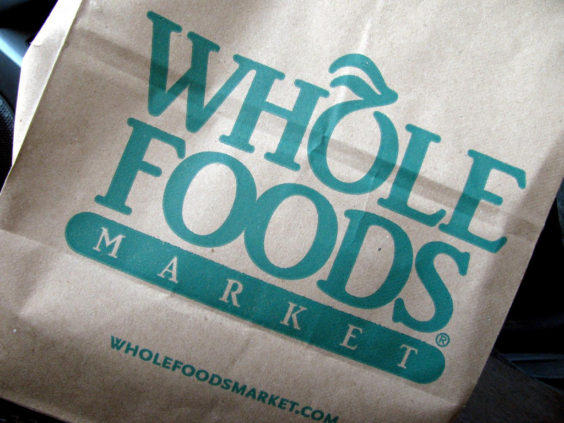
“You guys are a bunch of hippies selling to other hippies!” That’s what Whole Foods co-CEO John Mackey recalls hearing from a skeptical investor many years ago. But over time, Whole Foods gained acceptance, as healthy and organic offerings became more mainstream.
Now, they’re so mainstream, you can grab healthy, organic food while you’re out shopping for socks at Walmart. And at a discounted price, too.
Which is to say – Whole Foods has a big problem.
The high-end grocery chain released disappointing financial results last week, rattling investors and causing some to question the company’s otherwise rosy outlook. “The growing demand for fresh healthy foods, the offering of natural and organic products is expanding everywhere,” Mackey acknowledged to investors on Tuesday, before putting a cheery spin on it: “That’s a positive for us, as it affirms our mission for the last 36 years.”
Investors weren’t having it. In a frank and sometimes tense conference call, investors went after the company’s leadership, on everything from Whole Foods’ strategy, to its outlook, to its very future.
“Does Whole Foods management appreciate that the world has changed and there’s a lot more competition out there?” asked J.P. Morgan’s Ken Goldman. “I’m not really hearing anything that’s suggesting management is taking this situation as seriously as some investors want you to.”
“Well, we’re lowering prices,” Mackey offered tentatively, to which Goldman retorted, “You’ve been doing that for years.”
Whole Foods actually has been making an effort to lower prices and offer more value-oriented options. “We’re going to be investing more aggressively in price going forward,” Mackey said.
But his comments came just a month after Target announced it would debut more than 100 exclusive products from various natural, organic and sustainable brands. And it follows Walmart’s recent announcement that it would be going organic in a big way.
Walmart is rolling out Wild Oats-branded organic foods items, which it promises will be priced at least 25% less than comparable national brand organic products. “We know our customers are interested in purchasing organic products and, traditionally, those customers have had to pay more,” Walmart’s executive vice president of grocery Jack Sinclair said in a statement. “We are changing that and creating a new price position for organic groceries that increases access.”
Affordable organic food? You mean there is such a thing? Apparently so. That might lead the cynical to say that the only reason Whole Foods is “investing in price” now, is because consumers are onto them.
“Whole Foods has historically been able to charge prices that are well above wholesale, with customers none the wiser since the local grocery store didn’t sell the same items,” writes the Wall Street Journal’s Justin Lahart. With everyone from Kroger and Safeway, to Target and Walmart, getting into the organic game now, that’s no longer true – nor is it a particularly viable business strategy anymore.
That said, “we’re never going to be (in) a race to the bottom, chase it only on value, only on price,” co-CEO Walter Robb said. “That’s not who we are and that’s not what we’ve been and that’s not what we’re going to be.” Instead, he said, Whole Foods plans “to continue to raise the bar on quality, continue to evolve the experience at our stores… and continue to have thousands of exclusives and differentiated products that represent choices in the marketplace for customers that they don’t have.”
After all, price investments, sales and coupons aside, people don’t really shop at Whole Foods for low, low prices. Nor do people shop at Walmart for the “differentiated experience”. In the end, whether organic grocery shoppers decide to pay a premium, or save a buck, will determine whether Walmart may ultimately be the one getting your “whole paycheck” – and offering a whole lot more for it.











It is early days, but there are evidently clouds on the horizon for WholePaycheck/SmugFoods. Over here in the UK we are a fair bit behind you lot, and I only went into my first WholeFoods a couple of months back. The caramel slice thing is amazing, but I digress. WholeFoods are quite diverse in what they offer (sushi, hot food etc etc), and one analyst I was speaking to believes this will keep them in the game. We don’t have many Walmarts here in the UK, and our WholeFoods tend to be in expensive areas, where they are developing a strong brand, and do not have to fear a Walmart or something of that ilk encroaching on their turf.